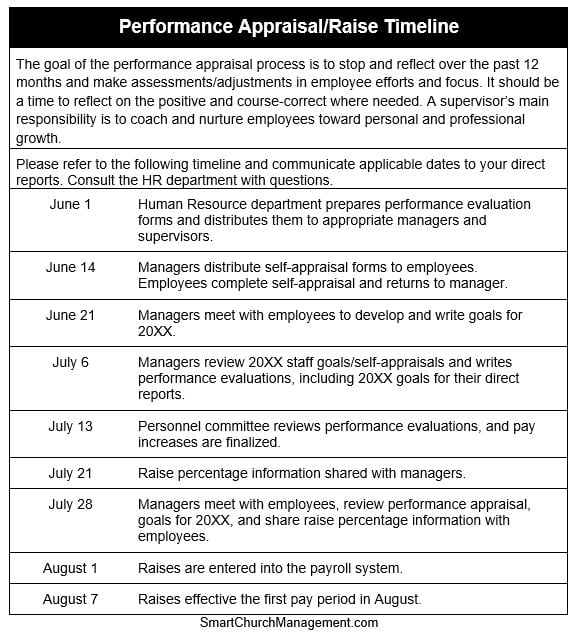Estimated reading time: 6 minutes
There are not many people who will tell you (honestly) that they like conducting performance evaluations.
However, performance evaluations, done right, can be a positive experience for employees.
Particularly if there is a reward benefit to performing well.
The performance appraisal should be the final step in a process that climaxes with the employee evaluation and raise distribution.
It should be a time of reflection, celebration, and forward-thinking.
Employees Should Be Involved
Employees who participate in the process of defining goals are typically more successful at completing them because they have an understanding of the expectations.
“Effective performance management systems have a well-articulated process for accomplishing evaluation activities, with defined roles and timelines for both managers and employees. Especially in organizations that use performance management as a basis for pay and other HR decisions, it is important to ensure that all employees are treated in a fair and equitable manner.” Elaine D. Pulakos – SHRM FOUNDATION
Performance management systems need to be strategic, intentional, and focused on employee productivity, development, and rewards.
8 Tips For Conducting Performance Evaluations
1. Determine Budget For Raise Increase Percentage
Churches should include salary increase percentages in the annual budget.
At the beginning of the church budgeting cycle, there should be discussions that determine a raise dollar pool.
This pool should then be used to reward employees who do a good job and help the organization fulfill its mission.
An important aspect of this is to let employees know how much is in the raise pool so you can manage their pay increase expectations.
There is nothing worse than having a high-performing employee who expects a 5% increase when there has only been 3% budgeted.
Managing employee expectations will help to bridge the pay increase reality gap.
2. Create A Timeline
No one likes surprises. Create a timeline that lets employees know when to expect to receive their annual performance appraisal and raise. Assuming they met all the criteria for a pay increase.
This includes a timeline to establish employee goals for the next cycle and to update job descriptions to reflect the new goals.
The timeline should reflect a 60 – 90-day process that allows enough time to gather the needed information and write the performance evaluation for each employee.
An example timeline might look something like this:
Example Performance Evaluation Timeline

You can access an editable copy of this timeline here.
3. Gather Performance Documents
Now is when you will be thankful that you kept organized notes and files on all of your employees.
Go through these notes on each of your employees to remind yourself of those things that the employee did well – as well as those things that required coaching or redirection.
Then, review how well the employee completed their goals from the last review cycle.
Make a list of examples to use on the appraisal form. This information should be used as a reference as you fill out the performance appraisal form.
4. Schedule Time to Write Performance Evaluations
For a manager, this can be one of the most important times of the year.
Your job is crucial because you are responsible for managing professional development and ultimately rewarding your employees.
It takes time to be fair when writing performance evaluations.
Be sure to block out time on your calendar to allow for the adequate focus it deserves.
A simple rule of thumb is to allow one hour of prep for each employee.
You owe it to your employees to take the necessary time to evaluate and develop them.
5. Seek An Objective Review
We all come to work with unconscious biases that can impact how we might rate an employee.
Be aware of those rater biases and find a peer who knows the employee to review your ratings and comments.
When you allow someone who is objective to review your thoughts, you are given the opportunity to expose any subconscious blind spots you might have.

Most would prefer a peer to point out where we might have missed something rather than an argumentative and defensive employee.
The goal of the performance appraisal is to be objective and fair. And, if you are and come prepared with specific examples that determined your ratings, it makes it difficult for the employee to debate your assessment.
Some organizations ask the employee to do a self-assessment so that they take some time to reflect on their performance.
6. Schedule Time To Conduct the Evaluation
This is an important conversation, so be sure to schedule ample time to meet with the employee.
You want to have plenty of time to discuss observations, development opportunities as well as answer any questions the employee may have.
Remember, you always want to make the employee feel as comfortable as possible, so plan to do this kind of review in a neutral location – not your office!
7. Celebrate Successes
It is easy to lose sight of the many accomplishments that occur over the course of a year.
Make a point of recognizing those successes, acknowledging the employee’s contribution, and thanking them for being part of the team.
This is as important as disciplining employees who miss the mark or drop the ball.
8. Share Raise Information
Sharing raise information should be an appreciative and celebratory time. Congratulate employees for a job well done.
However, if you have an employee who is receiving a less than average raise, it is your responsibility to explain to them the “why” behind that decision.
Make sure they understand what it was that they did or didn’t do that influenced their rating and give them pointers on how to improve their performance for next year.
Regardless of the process or system for doing performance evaluations, it can be a period of high stress – and even paranoia.
However, the more time, effort, and preparation you devote to it, the more likely it will result in a meeting with your employee that acknowledges their efforts and rewards them for their contributions.
We Have Done The Work For You!
If you are a member, you can access a raise process timeline and performance appraisal form in our growing library by logging in here. If you are not a member but would like to explore our library, you can do that here.



